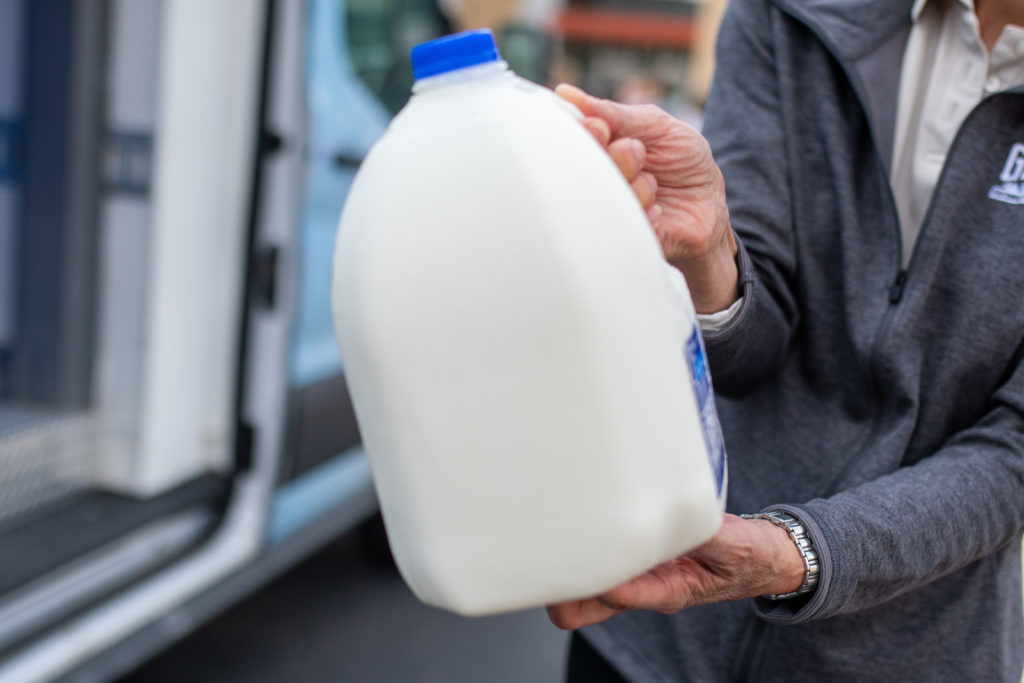Michigan Milk Producers Association’s (MMPA’s) partnership with the Food Bank Council of Michigan (FBCM) helps provide all 83 counties in Michigan with a supply of nutritious dairy products for those struggling with food insecurity. Kath Clark, Director of Food Programs at FBCM answered a few commonly asked questions:
What is the Food Bank Council of Michigan and what is your relationship with member food banks?
The Food Bank Council of Michigan (FBCM) was founded in 1984 through the cooperative efforts of the state’s regional food banks. FBCM purchases food and distributes it to member food banks who service a specific geographical region and provide food and resources to pantries in their communities. Food pantries can “shop” the regional food bank to acquire food that meets the needs for their own community programs and services.
How did the COVID-19 pandemic affect your organization?
We distributed almost 50 percent more food than any other time we ever have. We went from using brick and mortar pantries to doing mobile distributions, a safer and more efficient model for our older, higher-risk volunteers. The shutdown happened so quickly that many people were not prepared, and we all remember how bare the shelves at grocery stores were. It was hard to find food and we had a lot of people utilizing our services for the first time in their lives.
What challenges are you facing today?
The supply chain challenges are hitting us hard, and inflation is staggering. We all see the effects of those challenges when we go to the grocery store and buy our own family’s groceries. When we are buying a truckload of groceries at a time and see the prices go up the same way, our food banks are telling us that they are easily 25 percent over budget for food purchases. Within the last month with gas prices skyrocketing, we are beginning to see an increase in the number of people visiting food pantries again, all at a time when our capacity to purchase had decreased because of inflation.
What is your relationship with MMPA?
MMPA is the organization that taught us how to handle milk in our food banks. Milk has always been the most requested item at food pantries, and it used to be that the milk that we received, more often than not, was milk near expiration donated by local grocers or retail outlets. Obviously that milk didn’t have a long shelf life and we would just get it out as fast as we could to the places we could. Having fresh milk donated by MMPA that had time on it and that we could properly distribute to everyone who needed it was a luxury we never had before. MMPA is the cornerstone of our milk program and it’s now one of the great examples that Feeding America showcases at a national level. Our relationship with MMPA is special.
How can someone help donate milk to their food bank?
Someone looking to donate dairy to the Food Bank Council of Michigan can buy gallons of milk online at https://vfd.fbcmich.org/shopping/. You can also contact your regional food bank to make a donation designated for purchasing dairy products.
Journey from the Farm to the Food Insecure
Supplying fresh milk to all 83 counties in Michigan requires extensive reliance on numerous industry partners and precise transportation logistics. The unique partnership between MMPA, the Food Bank Council of Michigan (FBCM) and Kroger’s Michigan Dairy makes what was once an improbable feat of supplying those in need in all corners of Michigan with fresh dairy, into a well-oiled machine providing a mainstay product that those who are food insecure can rely on today. The donation model that MMPA helped establish with FBCM and Michigan Dairy, has since been replicated in other states in the country. Take a look at the journey milk takes from MMPA member farms to the food insecure in your local communities.
1. MMPA Member Farm
Every donation of milk begins on member farms. Dairy farms are critical components of their local communities and caring for those in need comes second nature. For nearly a decade now, MMPA has worked with their member owners to facilitate their generous donation of fresh, wholesome milk. Since 2015, MMPA has donated nearly 342,000 gallons of milk.
2. Processor
After donated milk is picked up from the farm, it is brought to Michigan Dairy, a Kroger plant in Livonia, Michigan. At the plant, the milk is unloaded and is pasteurized and bottled into gallon jugs that are ready for consumers. Michigan Dairy generously donates the use of their plant and the milk’s processing and packaging.
3. Food Bank
From Michigan Dairy, the gallons of milk are distributed to the seven food banks in Michigan based on the orders they place to the FBCM. Each food bank is allocated a certain amount of milk determined by Feeding America and based on the number of people who are food insecure in the region. The allocation process ensures that milk is distributed fairly based on communities’ needs.
4a. Food Pantries
The 2,800 brick-and-mortar food pantries that the FBCM partners with can then place their order online with their region’s food bank to either pick up their milk or have it delivered. A challenge with supplying food pantries with dairy is their infrastructure and access to keep milk safely in a cooler. The FBCM’s partnership with the United Dairy Industry of Michigan looked to overcome that by supplying food pantries grant opportunities to receive a milk cooler.
4b. Mobile Distribution Centers
Milk can also be distributed via mobile distribution centers. The nearly 3,000 distribution sites were a major success during the COVID-19 pandemic because they allowed volunteers to distribute food outdoors. The distribution center orders food online from the food bank, just like the brick-and-mortar food pantries. After receiving their shipment, the milk is held in a large, refrigerated truck and cars line up to receive a box of food filled with fresh produce, dairy products and other goods.
5. The Food Insecure
Finally, from the food pantry and mobile distribution center, the gallons of milk end up in the hands of those in need, supplying the nine essential nutrients and helping round out a healthy diet. Today, approximately 1.9 million Michiganders are food insecure and with the current economic climate, the number is predicted to continue to grow. MMPA, FBCM and Michigan Dairy are committed to continue fighting hunger and providing dairy to those in need.
This article was originally published in the May/June 2022 issue of the Milk Messenger. Subscribe »

